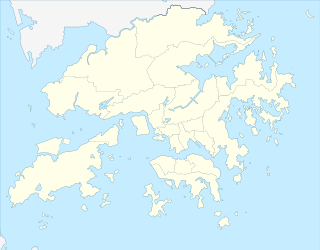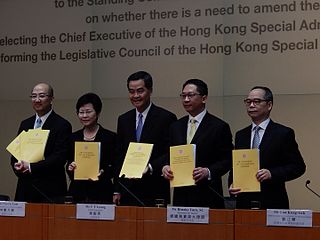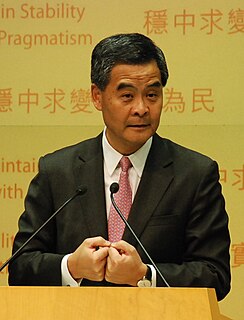 W
WThe following lists events from 2014 in Hong Kong.
 W
WThe Fifth Legislative Council of Hong Kong is the former meeting of the legislative branch of the Hong Kong Special Administrative Region Government. The membership of the LegCo is based on the 2012 election. The term of the session is from 1 October 2012 to 30 September 2016, during the term in office of the Chief Executive Leung Chun-ying. Due to the new arrangements agreed in a contentious LegCo vote in 2010, the session consists of the new total of 70 seats in LegCo, ten more than previously, with 35 members elected in geographical constituencies through direct elections, and 35 members in functional constituencies, in which five District Council (Second) functional constituency seats each represent all 18 District Councils of Hong Kong voted for by all resident voters in Hong Kong. The Democratic Alliance for the Betterment and Progress of Hong Kong remained the largest party while the pan-democrats secured the one-third crucial minority. Notable new members of the LegCo members include Gary Fan from the new established party Neo Democrats and first openly gay councillor, People Power's Ray Chan Chi-chuen.
 W
WThe Democratic Party leadership election was held on 14 December 2012 for the 30-member 11th Central Committee of the Democratic Party in Hong Kong, including chairperson and two vice-chairperson posts. Incumbent Chairperson Emily Lau secured her post against three other candidates after two rounds of election.
 W
WThe 2014 Hong Kong class boycott campaign, also known as 922 Class Boycott and 926 Class Boycott, is a student strike protesting the PRC Standing Committee of the National People's Congress's restriction on nomination system of the election of the Chief Executive in the 2016 and 2017 Hong Kong Political Reform. The campaign, jointly organised by the Hong Kong Federation of Students and Scholarism, was participated in by university students from 22 to 26 September and later also by secondary school students on 26 September. The student movement evolved into the 2014 Hong Kong protests in which several regions across the Victoria Harbour were occupied by pro-democracy protesters.
 W
WOn 5 May 2014, the cargo ship Zhong Xing 2 and the container ship MOL Motivator collided off Po Toi Island near Hong Kong, resulting in Zhong Xing 2 sinking. All but one of Zhong Xing 2′s 12-man crew were left missing and presumed dead; a rescue operation was conducted by Chinese authorities, and a fishing vessel rescued one man, Zhong Xing 2′s sole survivor.
 W
WThe Hong Kong electoral reform was a proposed reform for the 2017 Hong Kong Chief Executive election and 2016 Legislative Council election.
 W
WThe 33rd Hong Kong Awards ceremony, honored the best films of 2013 and took place on 13 April 2014 at Hong Kong Cultural Center, Kowloon, Hong Kong. The ceremony was hosted by Teresa Mo, Gordon Lam and Ronald Cheng, during the ceremony awards are presented in 19 categories and 1 Lifetime Achievement Award.
 W
WIn October 2014, it was reported that Leung Chun-ying, Chief Executive of Hong Kong, had signed an agreement in 2011 with UGL Limited, an Australian engineering firm, in relation to its takeover of DTZ Holdings, a UK-listed real estate services company in which Leung was the director of the company. In agreement, UGL undertook to pay Leung £4 million in two instalments in 2012 and 2013 respectively, subject to specific conditions. As these payments concurred with the term of office of Leung Chun-ying as Chief Executive between 2012 and 2017, it has aroused concerns of the public in respect of the nature of payment, potential conflict of interests, relevant systems of declaration of interests and taxation implications.
 W
WOccupy Central with Love and Peace was a single-purpose Hong Kong civil disobedience campaign initiated by Reverend Chu Yiu-ming, Benny Tai and Chan Kin-man on 27 March 2013. The campaign was launched on 24 September 2014, partially leading to the 2014 Hong Kong protests. According to its manifesto, the campaign advocates for an electoral system in Hong Kong that is decided through a democratic process and satisfies international standards of universal and equal suffrage. With the first three stages of the movement – dialogue, deliberation and citizens' authorization – the civil disobedience that follows must be non-violent.
 W
WA series of sit-in street protests, often called the Umbrella Revolution and sometimes used interchangeably with Umbrella Movement, or Occupy Movement, occurred in Hong Kong from 26 September to 15 December 2014.
 W
WThe University of Hong Kong pro-vice-chancellor selection controversy surrounds alleged political interference behind the University of Hong Kong governing council's rejection of Johannes Chan's recommended appointment to the post of pro-vice-chancellor in charge of staffing and resources. Chan, dean of the Faculty of Law from 2002 until 2014, had been unanimously recommended for the post by a selection committee headed by university president Peter Mathieson. The governing council's decision, the first time that a candidate selected by the committee has been rejected, is widely viewed as political retaliation for Chan's involvement with pro-democratic figures including his former subordinate Benny Tai. A majority of HKU Council members are not students or staff of the university, and many are directly appointed by incumbent HKSAR Chief executive Leung Chun-ying. The decision has received international condemnation, and is being viewed as part of a Beijing-backed curtailing of academic freedoms that will damage Hong Kong's academic reputation.